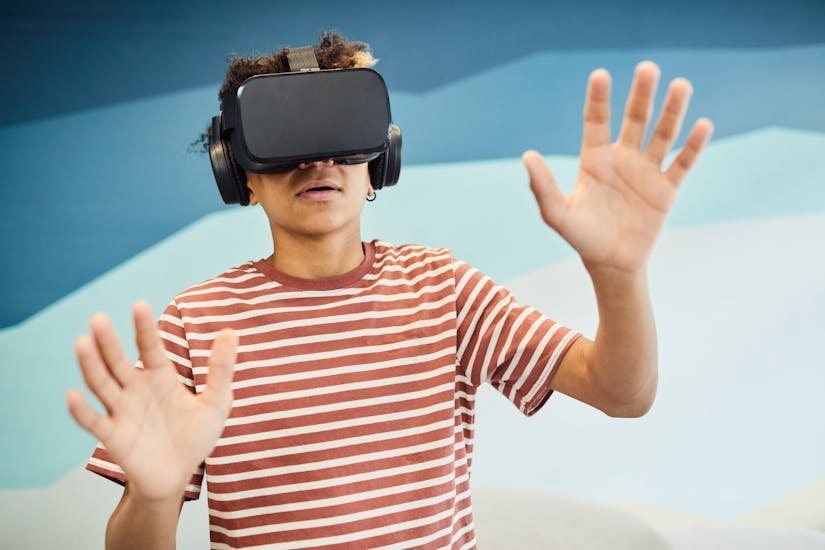
Virtual reality usage in daily life: Consumers weigh in on likelihood and concerns
From battling dragons to attending virtual concerts, virtual reality (VR) offers a glimpse into a fantastical future. But will VR headsets become everyday essentials? This is precisely the question a recent YouGov survey sets out to answer. The survey also asks consumers across 17 international markets what concerns they have should VR headsets become a part of everyday life.
Fantasy or future?
Data from YouGov Surveys: Serviced reveals that understanding what role VR headsets could play in our daily lives is complicated. Equal proportions of consumers across 17 international markets feel VR headsets are going to become a part of daily life (41%) and that they won’t (41%). Less than one in five (18%) aren’t sure.
YouGov’s demographic data reveals that men are more likely than women (44% vs. 39%) to feel VR headsets are going to become a part of daily life.
When it comes to data from individual markets, YouGov data shows that Mexicans (61%) are the most optimistic about the future success of VR. They are the most likely across markets to believe that VR headsets could find their place in people’s daily lives. Consumers in the UAE (60%) and Poland (59%) closely follow.
In Asia, Indonesians (57%) are most likely to agree, followed by Indians (53%).
As for those who disagree - Swedes (52%) are the most likely to say it is unlikely that VR headsets might be integrated in daily life, followed by Hong Kongers (50%).
Half of all Americans (50%) are also of this opinion and so are 48% of Britons.
What worries consumers about daily VR use?
Lack of social interaction, privacy and data security and physical discomfort, our data reveals.
Nearly two in five (37%) consumers across markets are worried about the lack of social interaction that the integration of the VR headset into daily life might lead to.
More than a third (35%) say they are concerned about privacy and data security, while a quarter (25%) say using VR headsets in daily life might just be physically uncomfortable.
Women are more likely than men (39% vs. 34%) to be concerned about the lack of social interaction that the possible adoption of VR headsets into daily routine might cause. But men are more concerned (17% vs. 13%) that content or apps suitable to view via virtual reality are limited, if VR headsets were to become commonplace.
Moving on to data from individual markets, we see that nearly three in ten Hong Kongers (28%) are concerned about the setup and space requirements for VR headsets, followed by Singaporeans (28%). Consumers in Nordic markets, Sweden (9%) and Denmark (5%) are least concerned about setup and space requirements.
In fact, Danes are the most likely (38%) across markets to say they have no concerns about the possible integration of VR headsets in daily life. A similar proportion of French (37%) have no concerns as well.
Further, two in five Singaporeans (40%) say using virtual reality headsets in daily life might be physically uncomfortable, the most likely across markets to say so. Singaporeans (45%) along with Australians (45%) also account for the largest proportion of those across markets who are concerned about privacy and data security, closely followed by Indians (44%) and Americans (44%). While not directly related to data security, the appearance of VR headsets in not-so-ideal circumstances has already raised concerns in the US.
Nearly a third of consumers in the UAE (32%) say the possible integration of VR headsets in daily life might make time management difficult, while nearly a quarter of them (24%) feel the variety of content or apps accessible to consumers via VR headsets are limited.
The lack of social interaction that the integration of VR headsets into daily life might lead to is of top concern to Britons (46%) and Mexicans (46%) followed by Italians (45%) and Australians (44%) and Indonesians (44%).
Explore our living data - for free
Discover more tech content here
Want to run your own research? Run a survey now
Make smarter business decisions with better intelligence. Understand exactly what your audience is thinking by leveraging our panel of 26 million+ members. Speak with us today.
Methodology: YouGov Surveys: Serviced provide quick survey results from nationally representative or targeted audiences in multiple markets. The data is based on surveys of adults aged 18+ years in 17 markets with sample sizes varying between 503 and 2004 for each market. All surveys were conducted online in March 2024. Data from each market uses a nationally representative sample apart from Mexico and India, which use urban representative samples, and Indonesia and Hong Kong, which use online representative samples. Learn more about YouGov Surveys: Serviced.
Photo by Vanessa Loring on Pexels